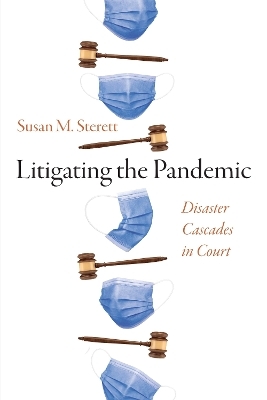
Litigating the Pandemic
Disaster Cascades in Court
Seiten
2023
University of Pennsylvania Press (Verlag)
978-1-5128-2483-4 (ISBN)
University of Pennsylvania Press (Verlag)
978-1-5128-2483-4 (ISBN)
As officials scrambled in 2020 to manage the spread of COVID, the reverberations of the crisis reached well beyond immediate public health concerns. The governance problems that emerged in the pandemic would be problems in other climate-related disasters, too.
Many of these governance problems wound up in court. Businesses filed insurance claims for lost commerce; when the claims were denied, some companies sued. Defense attorneys tried to get inmates released from prison, citing dangerous living conditions. As state governments ordered closures and otherwise tried to adapt, interest organizations that had long sought to limit government authority challenged them in court. Political officials railed against litigation they argued would stop businesses from reopening. The United States, like other countries, governs partly through litigation, and litigation is one way of seeing the multiple governance failures during the pandemic.
Drawing on databases of cases filed, news reports, and the websites of advocacy groups and law firms, Susan M. Sterett argues that governing during the pandemic, or in any disaster, must include the human institutions intertwined with the effects of the virus. Those institutions reveal problems well beyond the reach of technical expertise. Failures in private insurance as a way of governing risk, conflicts about the primacy of religion, government authority, and health, are problems that predated the pandemic and will persist in future disasters.
Many of these governance problems wound up in court. Businesses filed insurance claims for lost commerce; when the claims were denied, some companies sued. Defense attorneys tried to get inmates released from prison, citing dangerous living conditions. As state governments ordered closures and otherwise tried to adapt, interest organizations that had long sought to limit government authority challenged them in court. Political officials railed against litigation they argued would stop businesses from reopening. The United States, like other countries, governs partly through litigation, and litigation is one way of seeing the multiple governance failures during the pandemic.
Drawing on databases of cases filed, news reports, and the websites of advocacy groups and law firms, Susan M. Sterett argues that governing during the pandemic, or in any disaster, must include the human institutions intertwined with the effects of the virus. Those institutions reveal problems well beyond the reach of technical expertise. Failures in private insurance as a way of governing risk, conflicts about the primacy of religion, government authority, and health, are problems that predated the pandemic and will persist in future disasters.
Susan M. Sterett is Professor of Public Policy at the University of Maryland, Baltimore County.
| Erscheinungsdatum | 18.08.2023 |
|---|---|
| Reihe/Serie | Critical Studies in Risk and Disaster |
| Zusatzinfo | 7 tables, 1 figure |
| Verlagsort | Pennsylvania |
| Sprache | englisch |
| Maße | 152 x 229 mm |
| Themenwelt | Recht / Steuern ► EU / Internationales Recht |
| Recht / Steuern ► Privatrecht / Bürgerliches Recht ► Zivilverfahrensrecht | |
| Sozialwissenschaften ► Politik / Verwaltung ► Staat / Verwaltung | |
| Sozialwissenschaften ► Soziologie | |
| ISBN-10 | 1-5128-2483-6 / 1512824836 |
| ISBN-13 | 978-1-5128-2483-4 / 9781512824834 |
| Zustand | Neuware |
| Informationen gemäß Produktsicherheitsverordnung (GPSR) | |
| Haben Sie eine Frage zum Produkt? |
Mehr entdecken
aus dem Bereich
aus dem Bereich
mit Allgemeinem Gleichbehandlungsgesetz, Produkthaftungsgesetz, …
Buch | Softcover (2024)
dtv Verlagsgesellschaft
8,90 €
Grundkurs für Rechtsreferendare
Buch | Softcover (2023)
C.H.Beck (Verlag)
39,80 €


